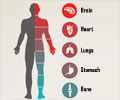A new study provides a better understanding of how stress affects the body’s response to the COVID-19 virus, and why some may be more prone to worst outcomes.

‘Diminishing the immune response to viruses such as COVID-19 and influenza makes the body less resistant to fighting infection and puts it at greater risk of complications and death.’





Advertisement
Discovery Connecting the Brain to the Immune System
More specifically, it was demonstrated that acute stress prompts neurons from the region known as the paraventricular hypothalamus to instantly trigger a large-scale migration of white blood cells (immune cells or leukocytes) from lymph nodes to the blood and bone marrow.First, researchers looked at groups of relaxed and stressed mouse models and analyzed their immune systems. Within minutes, mice experiencing acute stress showed big changes in their immune system when compared to the relaxed mouse group.
Specifically, stress-induced a major migration of immune cells in the body from one location to another. Investigators wanted to explain this phenomenon.
Advertisement
Stress Affecting our Immune System’s Ability to Fight Infections
Then, researchers went further to analyze how mice in the relaxed and stressed models compared when infected with influenza and COVID-19.They noticed that mice in the relaxed group fared better when compared to the stressed group — they fought infection better and got rid of the virus more easily. Mice in the stressed group were sicker, had less immunity, and had a higher rate of death from the virus.
The investigators also explored how other regions of the brain related to motor function control different types of immune cells traveling from the bone marrow to the blood.
Advertisement
Less Stress, More Immunity
The effect of stress on white blood cells and how it may negatively impact fighting a virus are important to further understand outcomes and find ways to improve immunity. If white blood cells continually enter the bloodstream, this could have implications for cardiovascular health as well.This study is an important example of how the brain controls inflammation and its link to diminishing an immune response during acute stress. This work may prompt physicians to further look into the mental state of patients, including sleep patterns and stress levels.
Moving forward, we will need to better understand the long-term effects of stress. It will be particularly important to explore how we can build resilience to stress and whether resilience can diminish stress’s negative effects on our immune systems.
Source-Medindia















